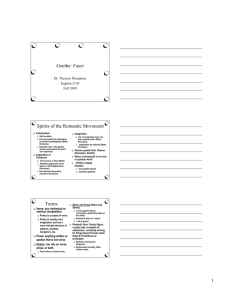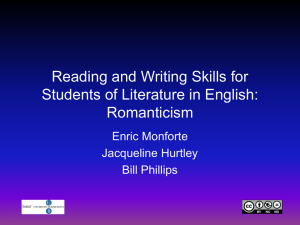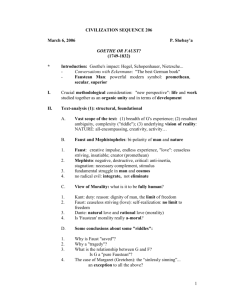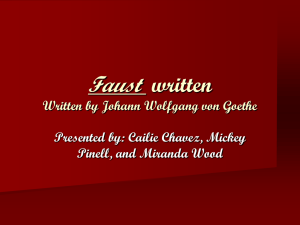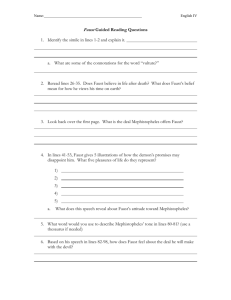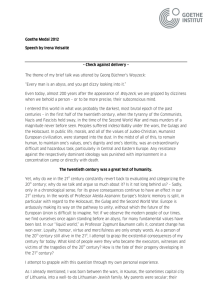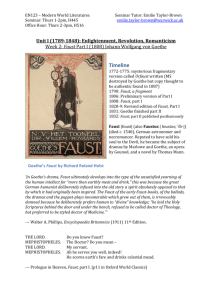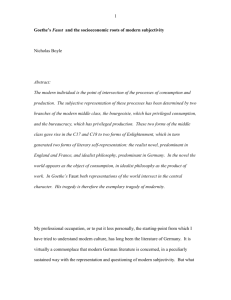葛瑞青與浪漫主義:哥德《浮士德》研究Gretchen and the Romantic
advertisement
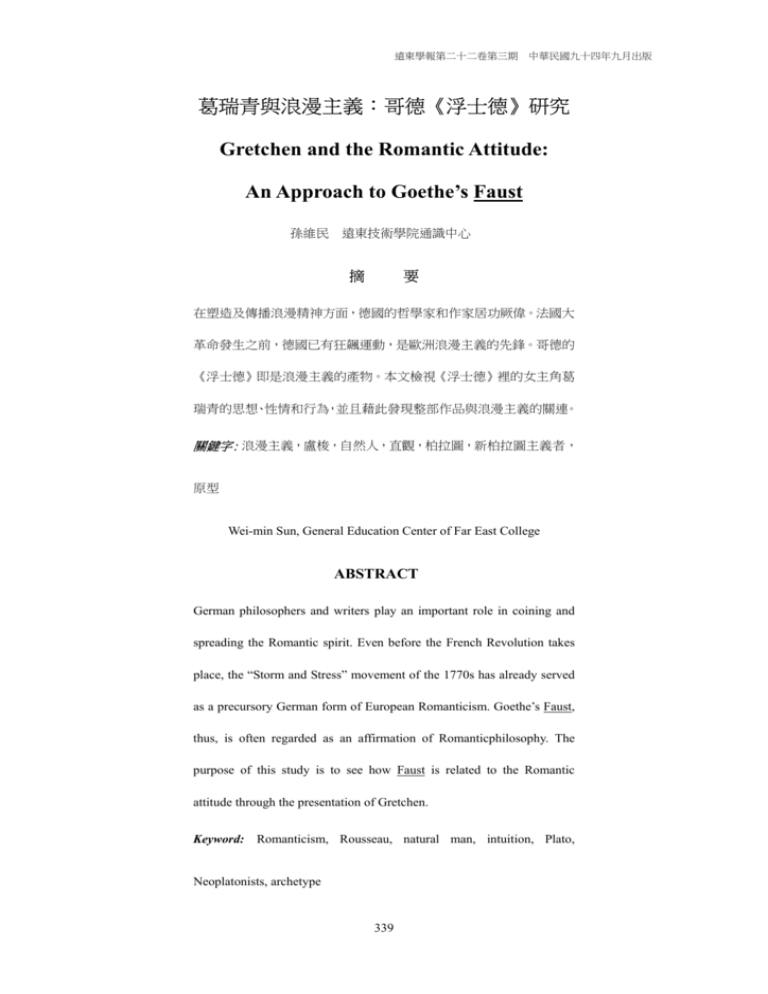
遠東學報第二十二卷第三期 中華民國九十四年九月出版 葛瑞青與浪漫主義:哥德《浮士德》研究 Gretchen and the Romantic Attitude: An Approach to Goethe’s Faust 孫維民 遠東技術學院通識中心 摘 要 在塑造及傳播浪漫精神方面,德國的哲學家和作家居功厥偉。法國大 革命發生之前,德國已有狂飆運動,是歐洲浪漫主義的先鋒。哥德的 《浮士德》即是浪漫主義的產物。本文檢視《浮士德》裡的女主角葛 瑞青的思想、性情和行為,並且藉此發現整部作品與浪漫主義的關連。 關鍵字: 浪漫主義,盧梭,自然人,直觀,柏拉圖,新柏拉圖主義者, 原型 Wei-min Sun, General Education Center of Far East College ABSTRACT German philosophers and writers play an important role in coining and spreading the Romantic spirit. Even before the French Revolution takes place, the “Storm and Stress” movement of the 1770s has already served as a precursory German form of European Romanticism. Goethe’s Faust, thus, is often regarded as an affirmation of Romanticphilosophy. The purpose of this study is to see how Faust is related to the Romantic attitude through the presentation of Gretchen. Keyword: Romanticism, Rousseau, natural man, intuition, Plato, Neoplatonists, archetype 339 遠東學報第二十二卷第三期 中華民國九十四年九月出版 In the “Prologue in Heaven,” Goethe has affirmation of the philosophy of Romanticism. already affirmed human nature and human But how are the two related, and to what extent? potentiality. “Men make mistakes as long as they Since a full discussion of this topic strive” (77), and yet, like the trees tended by seems impossible here, in this essay I will focus God, the “gardener” (70), they will keep on my discussion on Gretchen to see how this growing and finally bear fruit. Man’s “striving” character in Faust is connected with the or action, the “Deed” (“Study I” 60) which Faust Romantic attitude. regards as the very beginning of creation, is what From the very beginning, Goethe makes it God values, and Faust, with his mistakes, is to rather clear that Gretchen owns a character of be forgiven by such a refusal to relapse into innocence, selflessness and naturalness. Faust inactive complacency. Faust is thus led to his falls madly in love with Gretchen when he first salvation because of his recognition of and sees her, insisting that Mephistopheles gets her constancy to the capacity of striving innate in for him. At first Mephistopheles hesitates upon human nature, Here, as Boyle points out, request because the Devil also recognizes the Goethe’s view is quite similar to Fichte’s: powerful virtue in this young girl: In thus identifying the heart of living An innocent thing. Innocent? Yes! nature with the heart of human nature At church with nothing to confess! Faust has advanced to a position similar to Over that girl I have no power. that of Goethe’s Idealist (“In the Street I” 21-23) contemporary, the reputedly atheist Fichte. Later, the hostility between Gretchen and Fichte saw the ultimate certainty of Mephistopheles is further illustrated. After philosophy as lying not in some mere fact Mephistopheles and Faust have left, Gretchen (Tatsache) that was known, but in returns to her room and senses, with fear, the evil which the reflecting self posited its own contamination of the Devil: existence. (44) It is so sultry, so fusty here, Undoubtedly, Goethe’s Faust is also an And it’s not even so warm outside. 340 遠東學報第二十二卷第三期 中華民國九十四年九月出版 I feel as if I don’t know what— To overflow into all things in ecstasy; I wish my mother would appear. After all which your lofty intuition I’m trembling all over from top to toe— (He makes a gesture.) I’m a silly girl to get frightened so. Will end—hm—unmentionably. (“Forest and Cavern” 66-76) (“Gretchen’s Room” 62-67) Gretchen’s It is obvious that Gretchen provides a purity, simplicity and When naturalness lead her to her tragedy as well as her Gretchen sings “The King of Thule,” her famous final salvation. In Gretchen, we find the song about a king’s faithful love to his dead representation of an ideal character upheld and mistress, such a contrast is marked again in that praised by the Romantics. She reminds us of Mephistopheles regards love as mere sexual Rousseau, who gives “natural man” and intercourse: childhood such unprecedented prominence in his sharp contrast to Mephistopheles. A supernatural gratification! Discourse on the Origin of Inequality Among To lie on the mountain tops in the dark Men and Confessions respectively. According to and dew Rousseau, “Man in a primitive state was Rapturously embracing earth and heaven, happy…and Swelling yourself to a godhead, ferreting confound his natural goodness” (Horton 344). through Humanity is essentially good when it is rid of the The marrow of the earth with divination, accretions of society and culture. Such an idea of To feel in your breast the whole six days “natural man” is obviously against the Christian of creation, doctrine of original sin: learning has only served To enjoy I know not what in arrogant Meditating on the first and simplest might operations of the human soul, I believe I And then, with the Old Adam discarded can see in them two principles which quite, precede the use of reason: the first 341 to 遠東學報第二十二卷第三期 中華民國九十四年九月出版 attaches us passionately to our well-being naivety, intuitiveness, integrity and and preservation, the second inspires fundamental innocence (xviii). in us a natural disinclination to see any The simplicity and innocence of the sentient being, and principally our child-like Gretchen are also praised in the works fellow human beings, perish or suffer of other Romantic writers. In England, for (Discourse 125). instance, Wordsworth is famous for his belief in As Rousseau maintains, the human soul in the unspoiled child to perceive the truth of life its “first and simplest operation” is good, intuitively, and thus, as he announces in “My because it is guided by two instincts: “love of Heart Leaps Up,” “The Child is father of the self” and pity. It has no desire to harm other Man “ (7). In “Ode: Intimations of Immortality human beings. In Faust, Gretchen seems to be an from embodiment of such qualities of “natural man,” Wordsworth goes further to use other terms to as well as of an innocent child. As Luke address a six-year-old child: Recollections of Early Childhood,” Thou, whose exterior semblance doth belie observes, Thy Soul’s immensity; But the new enthusiasm, inspired by Thou best Philosopher, who yet dost keep Rousseau, was for the natural, the Thy heritage, thou Eye among the blind, primitive, the uneducated, and the That, deaf and silent, read’st the eternal deep, unspoiled; and nowhere were these ideals Haunted forever by the eternal mind--- embraced with more fervour than by the Mighty Prophet! Seer blest! young Goethe and his “Storm and On whom those truths do rest…. Stress” followers (xv). (109-116) The Gretchen story reflects, for one thing, Wordsworth’s the current sentimental enthusiasm about unreserved praise of the innocence and intuition of the child is related to natural simplicity. Gretchen appeals so strongly to Faust because he is an his intellectual and she is not, because of her Neoplatonists’s, assumption that the soul is 342 understanding of Plato’s, or the 遠東學報第二十二卷第三期 中華民國九十四年九月出版 eternal and exists elsewhere before it descends sped into this world of mutability. The glory of the Through many a listening chamber, cave soul is gradually quenched when it enters the and ruin, darkness of matter, but the child still retains And starlight wood, with fearful steps some of the memories of its previous existence. pursuing In Wordsworth’s words, the child is still “trailing Hopes of high talk with the departed dead. clouds of glory” (64), while to the adult such a I called on poisonous names with which glory has already “faded into the light of our youth is fed; common day” (77). I was not heard—I saw them not— When musing deeply on the lot Among the Romantic poets in England, Wordsworth is certainly not alone to Of life, at that sweet time when winds are believe such a Platonic or Neoplatonic doctrine. wooing Shelley’s tie with Platonism is renowned. When All vital things that wake to bring discussing Shelley’s “A Defence of Poetry,” News of birds and blossoming,— Abrams points out that “there is more of Plato Sudden, thy shadow fell on me; in the ‘Defence’ than in any earlier piece of I shrieked, and clasped my hands in English criticism, even though it is a Plato who ecstasy! (49-60) has obviously been seen through a vista of Neoplatonic and Renaissance commentators and To Plato and the Neoplatonists, as well interpreters” (126). In his poems like “Hymn to as to Wordsworth and Shelley, it is difficult or Intellectual Beauty,” “To a Skylark” and “The almost impossible to find true knowledge in this Cloud,” to mention just a few, Shelley world of change, suffering and mortality. also expresses a similar idea. The following lines According are from “Hymn to Intellectual Beauty:” knowledge is gained only through recollection, to the Platonic doctrine, true that is, through the memory of the previous While yet a boy I sought for ghosts, and 343 遠東學報第二十二卷第三期 中華民國九十四年九月出版 existence. Such a view of the passage to strip it of its artificial wrappings, its knowledge is reminiscent of Rousseau’s theory arbitrary and conventional trimmings (Cassirer 15-16). of “natural man,” because, as Rousseau is also aware of, there is no way of reversing the In Faust, Gretchen may be regarded as an historical process and hence the impossibility of embodiment of “natural man,” who has found going back to nature again. In other words, it is the source of true knowledge. This is very likely unlikely to acquire genuine knowledge in the the main reason that Faust is so much attracted external also to her, since in all kinds of books the former has suggests that there is one source for the true been able to find only “the impossibility of knowledge of man, and, like Plato and the knowledge” (“Night” 12). world. However, Rousseau Romantics, Rousseau claims that this source can Works Cited be located only internally: The true knowledge of man cannot be [1]Abrams, M. H. The Mirror and the found in ethnography or ethnology. Lamp:Romantic Theory and the Critical There is only one living source for this Tradition. New York: Norton, 1958. knowledge—the source of self- [2]Boyle, Nicholas. Faust. Part One. Cambridge: knowledge and genuine self-examination. Cambridge UP, 1987. And it is to this alone that Rousseau [3]Cassirer, Ernst. “The Question ofJean-Jacques appeals; from it he seeks to derive all Rousseau.” proofs of his principles and hypotheses. In Harold Bloom. New York: Chelsea, 1988. order to distinguish the “homme naturel” 5-37. from the “homme artificiel,” we need Jean-Jacques Rousseau.Ed. [4]Goethe, Johann Wolfgang. Faust. Trans. Louis neither go back to epochs of the distant and MacNeice. New York: OxfordUP, 1962. All dead past nor take a trip around the world. quotations are taken from this edition and are Everyone carries the true archetype within cited by linenumber.--------. Faust. Part One. fortunate enough to discover it and to Trans. David Luke. Oxford: Oxford UP, 1992. 344 遠東學報第二十二卷第三期 [5]Horton, Rod William and Vincent F. Hopper. Backgrounds of European Literature: the Political, Social, and Intellectual Development Behind the Great Books of Western Civilization. Eaglewood: Prentice-Hall, 1975. [6]Rousseau, Jean-Jacques. Discourse on the Origins of Inequality Among Men. Trans. Maurice Cranston. New York: Penguin, 1984. [7]Shelley, Percy Bysshe. The Selected Poetry and Prose of Percy Bysshe Shelley. Ed. Carlos Baker. New York: Modern Library, 1951. All quotations are cited by line number. [8]Wordsworth, William. Selected Poems and Prefaces. Ed. Jack Stillinger. Boston: Houghton Mifflin, 1965. All quotations are cited by line number. 345 中華民國九十四年九月出版 遠東學報第二十二卷第三期 中華民國九十四年九月出版 346
